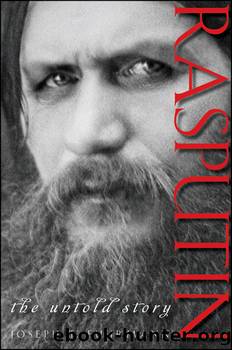Rasputin by Joseph T. Fuhrmann

Author:Joseph T. Fuhrmann
Language: eng
Format: epub
ISBN: 9781118239858
Publisher: John Wiley & Sons, Ltd.
Published: 2012-09-16T16:00:00+00:00
14
The Tsar Takes Charge and Loses Control
Having Done Quite A Lot to provoke the Great War, Nicholas II threw himself energetically into winning it. Factories ran at full capacity, and trains rushed soldiers to the front while his generals stunned the world by staging two grand offensives. The tsar appointed his cousin Nicholasha as commander-in-chief. Standing six feet, seven inches tall, the grand duke was an imposing and highly respected figure. The emperor overlooked Nicholasha's hostility to Rasputin in the widely shared expectation that he would lead the army to victory. But the German war machine was so powerful that when it counterattacked, the grand duke was forced to preside over what Russians called the “Long Retreat.” From the outset Nicholasha was hampered by shortages in war matériel and constant quarrels with Vladimir Sukhomlinov, the not-very-competent minister of war.
Nicholas II had a mystical conviction that a tsar's place was with his troops. He had always regretted not assuming command of his soldiers in 1904, when Japan attacked Russia. In 1914 his advisers convinced him to place Nicholasha in charge of battlefield operations. The tsar reluctantly agreed. But he was determined to make frequent visits to Stavka, the Slavonic term for general headquarters. It was initially located at Baranovichi, a railway station between the German and Austrian fronts. And so Nicholas bade his family farewell on September 19, 1914, and left on the first of many trips to headquarters.
“I am so happy for you that you can at last manage to go,” Alexandra wrote, “as I know how deeply you have been suffering all this time—yr. restless sleep has been ever a proof of it.” She thought that Nicholas had best not be “at the head of the army” but should limit himself to inspecting troops and visiting hospitals. He charmed and impressed everyone on these occasions. Although the last tsar was a short man, he had a regal bearing, and many were struck by the fact that he somehow seemed “taller than anyone else in the room.” He moved “with an extraordinary dignity” through hospital wards, his eyes establishing an “almost mystical sense of contact” with the patients he met. The emperor inspired loyalty and dedication in subjects of every rank and station, at least at the beginning of the conflict.
Alexandra flourished during the war. A need to serve had always characterized the empress, and now she was able to engage in the sort of practical work that she found important. She organized several hospitals and many Red Cross trains. Alexandra joined her daughters, Olga and Tatyana, and Anna Vyrubova in training as nurses and spending hours each week in the hospital that she established at Tsarskoye Selo. Alexandra assisted in operations and comforted sick and depressed soldiers. Rasputin encouraged these efforts. He believed that such work pleased God and inspired patriotic fervor. But some complained that these energies were misdirected. They insisted that an empress should limit herself to appearing at patriotic events and fostering wartime charities. Anyone could
Download
This site does not store any files on its server. We only index and link to content provided by other sites. Please contact the content providers to delete copyright contents if any and email us, we'll remove relevant links or contents immediately.
| Africa | Americas |
| Arctic & Antarctica | Asia |
| Australia & Oceania | Europe |
| Middle East | Russia |
| United States | World |
| Ancient Civilizations | Military |
| Historical Study & Educational Resources |
Rasputin by Joseph T. Fuhrmann(561)
Russian Revolution: A Concise History From Beginning to End (October Revolution, Russian Civil War, Nicholas II, Bolshevik, 1917. Lenin) (One Hour History Revolution Book 3) by Hourly History(335)
The Russian Revolution: A Very Short Introduction (Very Short Introductions) by S. A. Smith(333)
FROM RUSSIA, WITH LOVE by Ian Fleming(323)
Moscow Monumental by Katherine Zubovich(321)
The Russian Five by Keith Gave(310)
Reconstructing Lenin: An Intellectual Biography by Krausz Tamás(304)
Authoritarian Nightmare by John W. Dean & Bob Altemeyer(300)
Winter is Coming by Gary Kasparov(297)
Kremlin Rising by Peter Baker(274)
Io dirò la verità by Germano Maifreda(259)
Spetsnaz: The Inside Story of the Soviet Special Forces by Viktor Suvorov(244)
Russia Resurrected by Kathryn E. Stoner;(235)
My Further Disillusionment in Russia by Emma Goldman(233)
Voices From Stalingrad by Bastable Jonathan;(228)
13 KGB by Unknown(218)
The Russian Revolution in Ukraine (March 1917 â April 1918) by Nestor Makhno & Nestor Makhno(213)
Jihad and Death by Roy Olivier;(201)
Russian Revolution, 1917 (9781108109161) by Wade Rex A(188)
